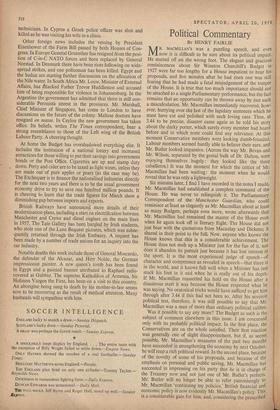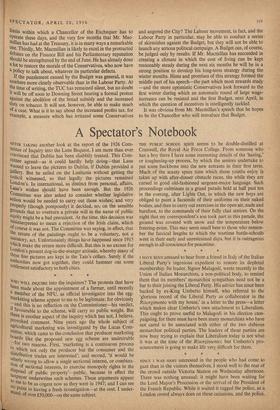Political Commentary
BY HENRY FAIRLIE MR. MACMILLAN'S was a puzzling speech, and even now it is difficult to be sure about its political impact. He started off on the wrong foot. The elegant and gracious reminiscences about Sir Winston Churchill's Budget in 1927 were far too lengthy for a House impatient to hear his proposals, and five minutes after he had risen one was still fearing that he had made a fatal misjudgement of the temper of the House. It is true that too much importance should not be attached to a single Parliamentary performance, but the fact remains that an opportunity can be thrown away by just such a miscalculation. Mr. Macmillan immediately recovered, how- ever, hurrying over the last of the lapidary sentences which he must have cut and polished with such loving care. Then, at 3.44 to be precise, disaster came again as he told his story about the darky porter, which surely every member had heard before and in' which none could find any relevance. At this moment Conservative members were looking dumb-founded, Labour members seemed hardly able to believe their ears, and Mr. Butler looked impassive. (Across the way Mr. Bevan and Mr. Wilson, separated by the genial bulk of Dr. Dalton, were enjoying themselves hugely : they looked like the three caballeros.) It was the moment for which the critics of Mr. Macmillan had been waiting : the moment when he would reveal that he was only a lightweight.
Six minutes later, I find I have recorded in the notes I made, Mr. Macmillan had established a complete command of the House. He was never to relinquish it. The Parliamentary Correspondent of the Manchester Guardian, who could reminisce atleast as elegantly as Mr. Macmillan about at least as many Budgets, perhaps even more, wrote afterwards that Mr. Macmillan had remained the master of the House even when he again took off in literary flight. The House did not just bear with the quotations from Macaulay and Dickens; it shared in their point to the full. Now, anyone who knows the House knows that this is a considerable achievement. The House does not mob up a Minister just for the fun of it, nor does it abandon its pursuit just because it has lost interest in the sport. It is the most experienced judge of speech—of character and competence as revealed in speech—that there is in the world, and it knows full well when a Minister has just stuck his foot in it and when he is really out of his depth. If Mr. Macmillan reasserted his hold on the House after a disastrous start it was because the House respected what he was saying. No oratorical tricks would have sufficed to get him through after 3.44 if this had not been so. After his severest political test, therefore, it was still possible to say that Mr. Macmillan was a man of more than ordinary political calibre.
Was it possible to say any more? The Budget as such is the subject of comment elsewhere in this issue. I am concerned only with its probable' political impact. In the first place. the Conservatives are on the whole satisfied. Their first reaction was generally one of slight disappointment, but if, as seems possible, Mr. Macmillan's measures of the past two months have succeeded in strengthening the economy by next October, he will reap a rich political reward. In the second place, because of the novelty of some of his proposals, and because of the emphasis on personal and public saving, Mr. Macmillan has succeeded in impressing on his party that he is in charge of the Treasury now and, not just one of Mr. Butler's prefects. Mr. Butler will no longer be able to refer patronisingly to Mr. Macmillan 'continuing my policies.' British financial and economic policy is now evidently Mr. Macmillan's policy. This is a considerable gain for him, and, considering the prescribed limits within which a Chancellor of the Exchequer has to operate these days, and the very few months that Mr. Mac- millan has had at the Treasury, it is in many ways a remarkable One. Thirdly, Mr. Macmillan is likely to excel in the protracted debates on the Finance Bill and his Parliamentary reputation should be strengthened by the end of June. He has already done a lot to restore the morale of the Conservatives, who now have a policy to talk about, whatever its particular defects. If the puzzlement caused by the Budget was general, it was nowhere more clearly observable than in the Labour Party. At the time of writing, the TUC has remained silent, but no doubt it will be off soon to Downing Street bearing a formal protest against the abolition of the bread subsidy and the increased duty on tobacco. It will not, however, be able to make much of a case. What is it to say about the increased profits tax, for example, a measure which has irritated some Conservatives and angered the City? The Labour movement, in fact, and the Labour Party in particular, may be able to conduct a series of skirmishes against the Budget, but they will not be able to launch any serious political campaign. A Budget can, of course, be judged only by results. If Mr. Macmillan has succeeded in creating a climate in which the cost of living can be kept reasonably steady during the next six months he will be in a strong position to develop his long-term strategy during the winter months. Hints and promises of this strategy formed the middle part of his speech—the part which most rewards study —and the more optimistic Conservatives look forward to the first winter during which an automatic round of large wage- increases can be resisted and the first Budget, next April, in which the question of incentives is intelligently tackled.
It was obvious from Mr. Macmillan's speech that he hopes to be the Chancellor who will introduce that Budget.



















































 Previous page
Previous page